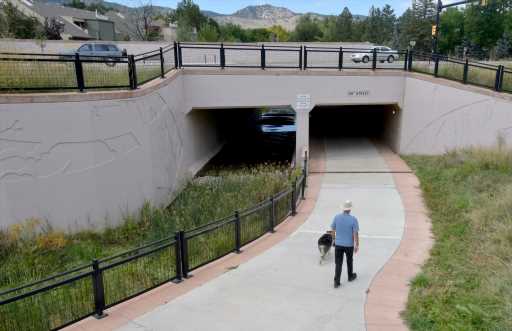Boulder’s updated comprehensive flood and stormwater master plan sets forth a new process for prioritizing projects while putting an emphasis on equity and climate resilience.
The plan, approved unanimously by the City Council on Thursday, focuses on the 16 major drainageways in Boulder, which staff says is the city with the highest flood risk in Colorado.
Of all that’s included in the plan, Boulder is perhaps most excited about its new process for prioritizing flood mitigation projects, given its hope that the new framework will be more objective and allow the city to maintain its focus on equity.
“Project prioritization has historically relied heavily on cost-benefit analyses and avoided damages, which results in prioritizing property protection in affluent areas,” Deputy Director of Public Works for Utilities Joanna Bloom said.
Moving forward, Boulder plans to prioritize projects that “do the greatest good,” first by analyzing a set of criteria, including cost, effectiveness, equity, life safety and whether it has multiple benefits.
It’s then able to score projects using this framework, which in turn helps the city prioritize its work.
“The inclusion of racial equity considerations has a tangible impact on how the city approaches its work,” Bloom said.
This was commended by the City Council during the public hearing on Thursday, with Councilmember Nicole Speer recommending the city take a similar approach in all its work.
“I really appreciate calling out the bias in prior project prioritization methods that provided more protection in affluent areas rather than places where life and safety risks are greatest,” Speer said. “I also really appreciate the objectivity in having a way to prioritize projects that align with our core values and minimize debate about what projects will go next.”
The plan also aims to make the city’s infrastructure more resilient to climate change by implementing projects faster, maximizing natural features such as wetlands in flood mitigation projects and maximizing flood protection and/or storage in major mitigation projects.
This could include projects like the $30 million Wonderland Creek flood mitigation project, whose features included an irrigation ditch overflow structure to help protect the residential area nearby from flooding.
“I think that our No. 1 job is community safety and this plan drives that forward in a pretty remarkable way,” Mayor Pro Tem Rachel Friend said on Thursday.
Though the plan was approved in a public hearing, just one person attended to speak on the matter and generally did not speak about the core of the plan itself, instead focusing on the city’s contested South Boulder Creek flood mitigation project.
As it moves ahead with the plan’s goals in mind, Boulder believes it would need some $350 million to accomplish about 30 projects. It ultimately will use funding sources including utility rates, federal grants and infrastructure dollars to help fund this within its goal of 30 to 35 years.
Now that the city has received support from the Council, it intends to move forward with its plan to develop a 20-year capital improvement plan that could begin in the 2024 budget cycle.
Source: Read Full Article
-
Why Starmer’s decision to sack Tarry is now particularly awkward for Rayner
-
Sturgeon lays into Liz Truss over ‘attention-seeker’ jibe – ‘She wanted to be in Vogue!’
-
‘Huge problems!’ Ex-Thatcher aide slams ‘arrogant’ Sunak following leadership debate
-
Braverman vows ‘no more illegal entry, no more tragedies’
-
Sturgeon humiliated as SNP’s social care plan ‘not enough’

